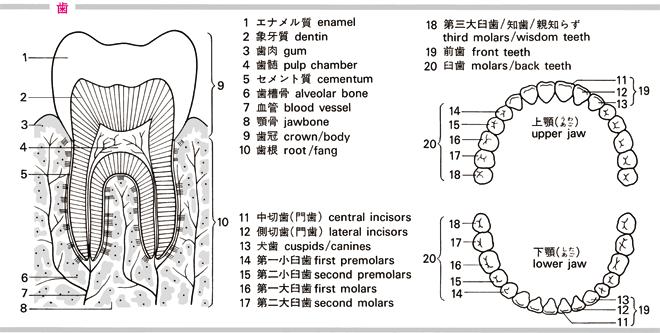プログレッシブ和英中辞典(第4版)の解説
は【歯】
❶〔人間・動物の〕a tooth ((複 teeth))

歯の根
the root of a tooth
歯の跡
a tooth mark
歯をみがく[ほじる]
brush [pick] one's teeth
昨日歯を1本抜いてもらった
I had a tooth 「pulled out [《文》 extracted] yesterday.
歯を治療してもらう
have one's teeth treated [fixed]
歯が痛い
I have a toothache.
この子は歯が生えだした
This child is teething [cutting a tooth].
この子は歯の生えるのが遅い
This child's teeth are slow to come in.
歯が抜け替わる
lose one's baby [milk] teeth and get one's permanent teeth
前歯がぐらぐらしている
My front teeth are loose.
歯が1本抜けた
A tooth came [fell] out.
犬が歯をむき出した
The dog bared [showed] its teeth.
❷〔器具などの〕
下駄の歯
the teeth on geta
くしの歯が1本欠けている
One tooth of the comb is missing [broken off].
のこぎりの歯
the teeth of a saw
歯車の歯がうまくかみ合わない
The cogs [gears] do not engage [mesh] properly.
歯が浮く
彼のバイオリンの音を聞くと歯が浮く
The sound of his violin sets my teeth on edge.
彼は歯の浮くような文章の手紙をよこした
He sent me a letter written in an irritatingly affected style.
歯の浮くようなお世辞はやめてくれ
《口》 Don't lay it on so thick.
歯が立たない
その仕事は私には歯が立たない
The job is too hard [difficult/much] for me./I am not equal to the job.
私なんか彼にはとうてい歯が立たない
I am no match for him.
歯に衣(きぬ)を着せない
彼は歯に衣を着せない
He does not mince matters [his words].
歯の抜けたよう
若者たちが都会へ行ってしまって村は歯の抜けたようだった
The village looked deserted after the young people had gone to the cities.
歯の根が合わない
怖さ[寒さ]で歯の根が合わなかった
My teeth chattered with fright [cold].
歯を食いしばる
歯を食いしばって痛みに耐えた
I clenched [gritted] my teeth to bear the pain.
彼女は歯を食いしばって苦境を乗り越えた
She overcame her difficulties with fortitude.

